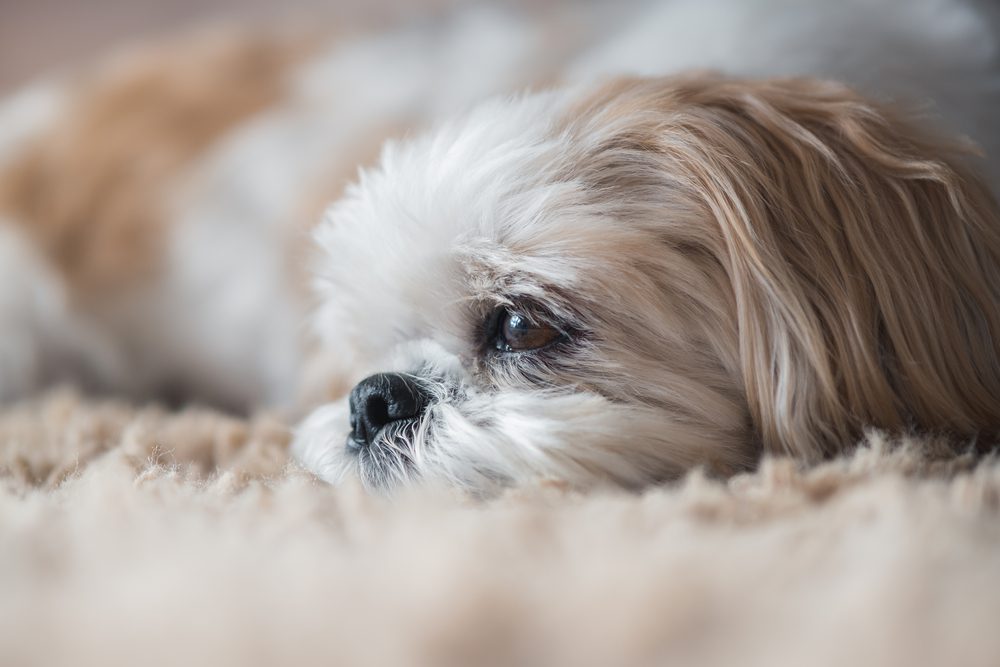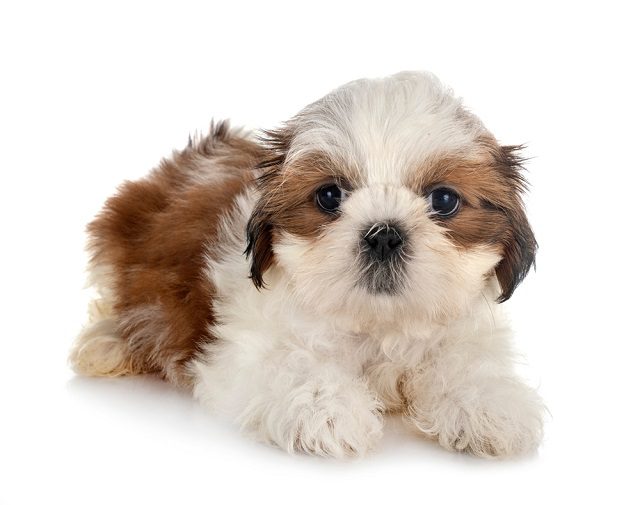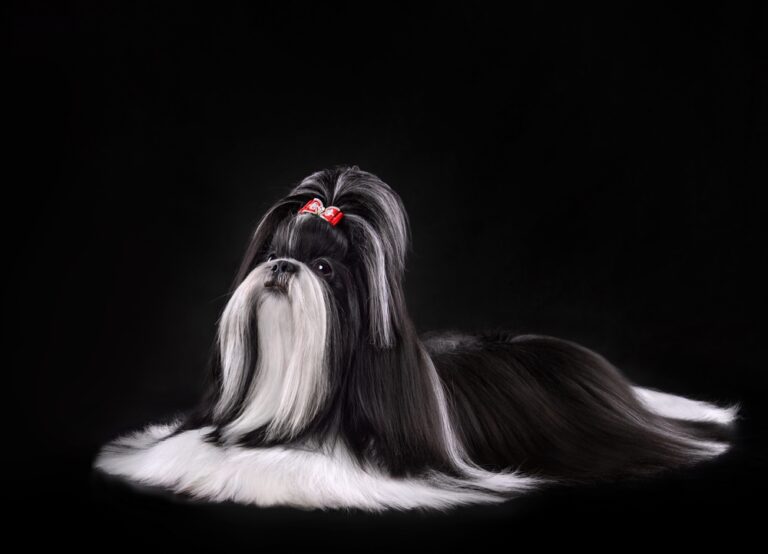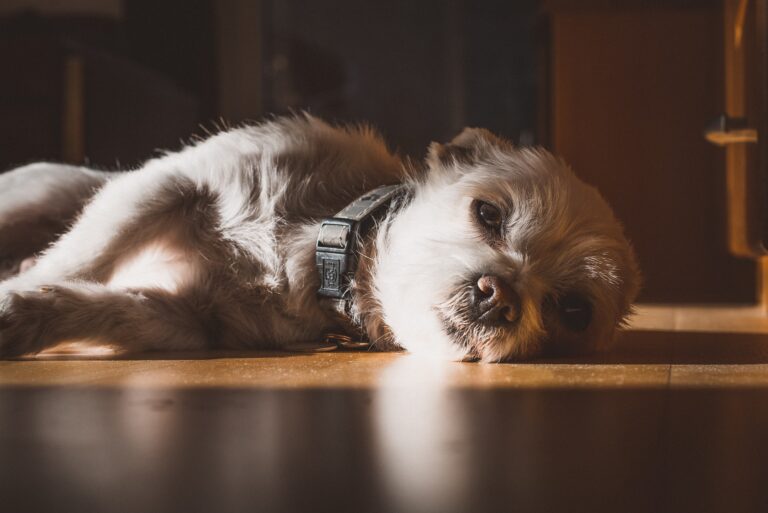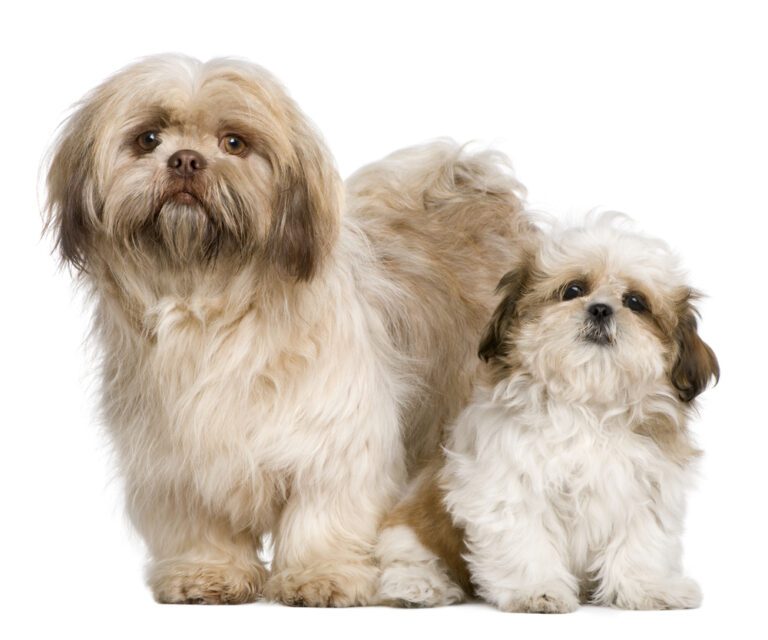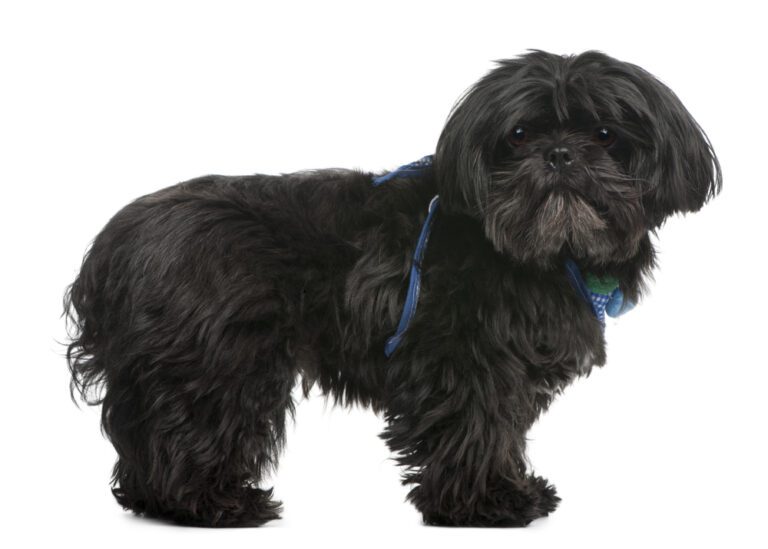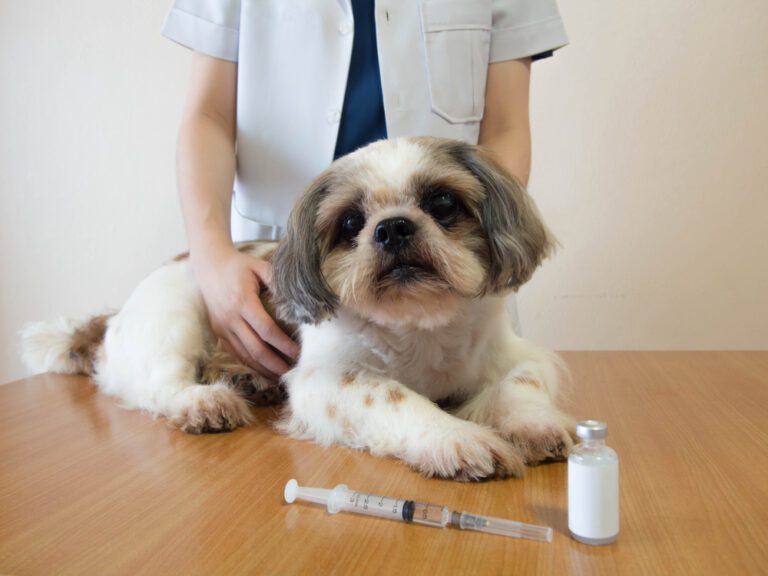Shih Tzu Umbilical Hernia: Comprehensive Guide to Symptoms, Treatment, and Prevention
An umbilical hernia happens when a part of the intestine pokes through a weak spot near the belly button, creating a small, soft bump that can be pushed back in but might come out again.
Shih Tzus are prone to umbilical hernias due to their genetics and small size, with some hernias present at birth if the belly button area does not close properly. Addressing this condition promptly is crucial, as untreated hernias can lead to serious problems like the intestine getting trapped and losing its blood supply, causing severe pain and illness.
Umbilical hernias might seem small, but they can cause big problems. Knowing what they are, why they happen, and why you must act fast can help keep your Shih Tzu healthy. It is very important to take your dog to the vet immediately if you see a bump near its belly button. The vet can tell you the best way to treat it. This ensures your Shih Tzu lives a joyful, pain-free life.
Identifying Symptoms of Umbilical Hernia in Shih Tzus
Visible Bulge Near the Navel
A noticeable bulge near the belly button is one of the most frequent signs of an umbilical hernia in Shih Tzus. This bump might be small or large and can sometimes be pushed back in. However, it may come out again when your dog is active or straining. Keep an eye on this area, especially when grooming or petting your dog. If you notice a new lump, it’s time to visit the vet.
Behavioral Changes Indicating Discomfort
Your Shih Tzu might show discomfort if they have an umbilical hernia. They could lick or bite at the area around the hernia. You might see them acting differently, like being less playful or more restless than usual. They might also whine or cry if the hernia is painful. Pay attention to these behavioral changes, as they signal something wrong.
Other Signs to Watch For
Apart from a visible bulge and changes in behavior, there are other symptoms to watch for. Your Shih Tzu might have trouble eating or lose its appetite. If the hernia is causing a blockage, it might also have trouble going to the bathroom. Look for signs of swelling, redness, or warmth around the bump, indicating an infection. If you notice any of these symptoms, getting your dog checked by a vet as soon as possible is important.
Recognizing the signs of an umbilical hernia early can make a big difference in your Shih Tzu’s health. If you see a bulge near their belly button, notice them acting uncomfortable, or spot other concerning symptoms, immediately take them to the vet. Quick action can prevent serious complications and help your Shih Tzu feel better faster.
Causes of Umbilical Hernia in Shih Tzus
Genetic Predisposition
Many Shih Tzus have a genetic predisposition to umbilical hernias. This means the condition runs in their family. If the parents or grandparents had hernias, the puppies might have them too. Genetics play a big role, making some Shih Tzus more likely to develop this condition. Knowing your dog’s family history can help you stay alert to potential issues.
Birth Defects
Sometimes, Shih Tzus is born with an umbilical hernia. This happens when the muscles around the belly button don’t close properly after birth. This hernia is present from the start and can be noticed early. It is one of the most common reasons for umbilical hernias in puppies. Regular check-ups with your vet can help detect and manage these hernias early.
Trauma or Injury
An umbilical hernia can also be caused by trauma or injury. If your Shih Tzu suffers a hard blow to the belly, it can create a weak spot in the muscle, leading to a hernia. Accidents, falls, or even rough play can cause this injury. Monitoring your dog’s activities and preventing situations that could lead to such injuries is essential.
Knowing the causes of umbilical hernias can help you prevent and manage them in your Shih Tzu. Genetic predisposition, birth defects, and trauma are the main reasons these hernias occur. By understanding these causes, you can take steps to protect your dog. Regular vet visits, careful monitoring of their activities, and knowing their family history are essential. This way, you can keep your Shih Tzu healthy and happy.
Diagnosing Umbilical Hernia in Shih Tzus
Veterinary Examination
The first step in diagnosing an umbilical hernia is a veterinary examination. The vet will feel the area around your Shih Tzu’s belly button to check for bulges. They will also ask about your dog’s health history and any symptoms you have noticed. This physical exam helps the vet understand the size and severity of the hernia.
Diagnostic Tests and Procedures
If the vet suspects a hernia, they might recommend additional tests. An X-ray or ultrasound can offer a clearer view of your dog’s abdominal condition. These tests help the vet see the exact location and size of the hernia. Blood tests might also be done to check for infections or other health issues. These diagnostic tools are crucial for precise diagnoses and optimal treatment planning.
Differentiating from Other Similar Conditions
Not all bumps near the belly button are hernias. The vet will need to rule out other conditions that might look similar. For example, an abscess or a tumor can also cause a lump. By examining the lump and using diagnostic tests, the vet can determine whether it is an umbilical hernia or something else. This differentiation is crucial for deciding the right treatment path.
Ensuring Accurate Diagnosis
Diagnosing an umbilical hernia in your Shih Tzu requires a thorough vet examination, diagnostic tests, and careful differentiation from other conditions. Early and accurate diagnosis ensures your dog gets the proper treatment. If you notice any unusual bumps or symptoms, don’t wait. Take your Shih Tzu to the vet for a proper check-up. This way, you can help your dog stay healthy and avoid complications.
Treatment Options for Shih Tzu Umbilical Hernia
Non-Surgical Approaches
Sometimes, a Shih Tzu’s umbilical hernia might be small and not cause any problems. For these minor hernias, non-surgical approaches can be practical. Your vet might recommend monitoring the hernia to see if it changes over time. Sometimes, the hernia can close on its own, especially in puppies. During this period, keeping your Shih Tzu from straining or getting injured is essential, as these actions can worsen the hernia.
Surgical Intervention
Surgery is frequently the optimal choice when a hernia is sizable or causing discomfort. Your vet will discuss when surgery is necessary. The procedure involves placing the intestine back into the belly and stitching up the weak spot. This surgery is usually quick and safe, but it requires careful aftercare.
Types of Surgical Procedures
There are different types of surgeries to fix an umbilical hernia. The most common is a simple hernia repair, where the vet stitches the muscles together. The vet might use a mesh to strengthen the area in more severe cases. Your vet will choose the best method based on the size and severity of the hernia.
1. Simple Suture Repair
This standard procedure involves suturing the weakened muscles together to close the hernia. It is suitable for smaller hernias with minimal tissue involvement.
2. Mesh Hernioplasty
For larger or more complex hernias, the veterinarian may perform a mesh hernioplasty. This technique uses a synthetic mesh to reinforce the abdominal wall and provide more outstanding structural support.
3. Laparoscopic Repair
In some cases, veterinarians may opt for laparoscopic techniques to repair hernias. This minimally invasive approach involves making small incisions and using a camera to guide surgical tools. It offers advantages such as reduced recovery time and less post-operative pain.
4. Open Herniorrhaphy
Open herniorrhaphy is another surgical option where the hernia is repaired through a larger incision. This approach enables direct visualization and repair of the hernia, selected based on its specific characteristics.
The choice of surgical technique depends on factors such as the size and location of the hernia, the presence of complicating factors, and the overall health of your Shih Tzu. Your veterinarian will assess these factors to determine the most appropriate surgical approach for achieving the best outcome and ensuring your pet’s comfort and recovery.
Post-Operative Care and Recovery
After surgery, your Shih Tzu will need special care to recover. Your veterinarian will guide you on how to care for your dog properly. This might include keeping the surgical area clean, preventing your dog from licking or biting the stitches, and limiting their activity to avoid straining the area. Pain relief medications might also be prescribed. Follow-up visits to the vet are crucial to ensure the hernia heals appropriately and to check for any complications.
Helping Your Shih Tzu Heal
Understanding the treatment options for umbilical hernias can help you make the best decision for your Shih Tzu. Whether monitoring a minor hernia or opting for surgery, the goal is to ensure your dog is healthy and pain-free. Proper care and attention after treatment will help your Shih Tzu recover quickly and return to their happy, playful self. If you have any concerns, always talk to your vet for the best advice for your furry friend.
Preventing Umbilical Hernia in Shih Tzus
Breeding Practices to Reduce Genetic Risk
Good breeding practices can help reduce the risk of umbilical hernias in Shih Tzus. Breeders should avoid mating dogs that have a history of hernias. This can help lower the chances of puppies inheriting the condition. If you are looking for a Shih Tzu puppy, choose a reputable breeder who tests their dogs for genetic issues. This careful selection can make a big difference in your puppy’s health.
Proper Prenatal and Postnatal Care
Taking care of a pregnant Shih Tzu and her puppies is very important. Ensure the mother dog gets good nutrition and regular vet check-ups during pregnancy. After the puppies are born, watch their belly buttons closely. Clean them gently and watch for any signs of a hernia. Early care can help prevent complications and ensure the puppies grow up healthy.
Avoiding Trauma and Injury
Preventing trauma and injury is key to avoiding umbilical hernias. Be gentle when handling your Shih Tzu, especially around the belly area. Make sure they don’t jump from high places or play too roughly. Supervise playtime to prevent accidents. Providing a safe environment for your dog helps protect them from injuries that could cause a hernia.
Keeping Your Shih Tzu Safe
Preventing umbilical hernias involves good breeding practices, proper care before and after birth, and avoiding injuries. Following these steps will contribute to the well-being and happiness of your Shih Tzu. Always be gentle with your dog and watch for any signs of trouble. Feel free to reach out to your vet if you notice anything unusual. Prevention is the best way to ensure your Shih Tzu lives a long, healthy life.
Prognosis and Long-term Care for Shih Tzus with Umbilical Hernia
Post-Surgery Outlook
The outlook for Shih Tzus after umbilical hernia surgery is generally very positive. Most dogs recover quickly and go on to live healthy, active lives. Your vet will monitor your dog’s progress to ensure the hernia heals properly. Follow-up visits are important to check the surgical site and overall health.
Long-term Health Management
Long-term care involves monitoring your Shih Tzu’s health to prevent complications. Regular vet check-ups are crucial. Your vet will check for any signs of recurrence or new health issues. Keeping your dog at a healthy weight can also reduce the risk of future hernias. A nutritious diet and regular exercise are essential.
Recognizing Potential Complications
While rare, complications can occur after hernia surgery. Watch for signs like swelling, redness, or discharge at the surgery site. If your dog shows signs of pain, refuses to eat, or has trouble moving, contact your vet immediately. Early detection and treatment of complications can prevent serious health problems.
Providing a Safe Environment
Creating a safe environment for your Shih Tzu is important for long-term health. Prevent activities that could strain the abdominal area, such as jumping from high places. Ensure your dog has a comfortable place to rest and recover after surgery. Providing a calm and safe environment helps your dog heal faster and prevents future injuries.
Emotional Support and Care
Like all dogs, Shih Tzus thrives on love and attention. After surgery, give your dog plenty of affection and reassurance. This emotional support can help reduce stress and promote healing. Spend quality time with your pet and keep their routine as normal as possible to make them feel secure.
Ensuring a Healthy Future
Understanding the prognosis and focusing on long-term care can help your Shih Tzu recover from an umbilical hernia and enjoy a happy, healthy life. Regular vet visits, a safe environment, and plenty of love are the best ways to ensure your dog stays healthy and happy. If you have concerns about your Shih Tzu’s health, always consult your vet for advice and guidance.
Conclusion
While concerning, umbilical hernias in Shih Tzus can be effectively managed with prompt diagnosis and appropriate treatment. Recognizing the symptoms and understanding the causes are crucial to ensuring your pet’s health. Whether opting for non-surgical monitoring or surgical repair, early intervention can prevent complications and promote a speedy recovery.
Preventive measures, including responsible breeding practices, proper prenatal and postnatal care, and avoiding trauma, can help reduce the risk of hernias. Post-surgery, providing a safe environment, regular vet check-ups, and emotional support are key to your Shih Tzu’s long-term health and happiness. By staying informed and proactive, you can ensure your beloved pet leads a healthy, active life free from the discomfort of umbilical hernias.
FAQ’s
Can Umbilical Hernia Heal on Its Own?
Sometimes, small umbilical hernias in Shih Tzus can close independently, especially in puppies. This happens when the muscles around the belly button strengthen over time. However, monitoring the hernia closely and consulting your vet is essential. Larger hernias or those causing discomfort usually require medical intervention.
How Much Does Hernia Surgery Cost for a Shih Tzu?
The cost of hernia surgery for a Shih Tzu can vary depending on factors like the size of the hernia and your location. It can range from several hundred to over a thousand dollars on average. Discuss the cost and payment options with your vet before proceeding with surgery.
What Are the Risks of Untreated Hernia?
Leaving an umbilical hernia untreated can lead to severe complications. The intestine or other abdominal organs might become trapped in the hernia sac, cutting off the blood supply. This can cause severe pain, infection, and even life-threatening conditions. Prompt veterinary care is essential to prevent these risks.
How Long Is the Recovery Period After Surgery?
The recovery period after hernia surgery varies depending on the size of the hernia and the procedure type. Generally, Shih Tzus recovers well with proper care and follow-up visits to the vet. Your vet will provide specific instructions on post-operative care, including medication, activity restrictions, and wound care.

